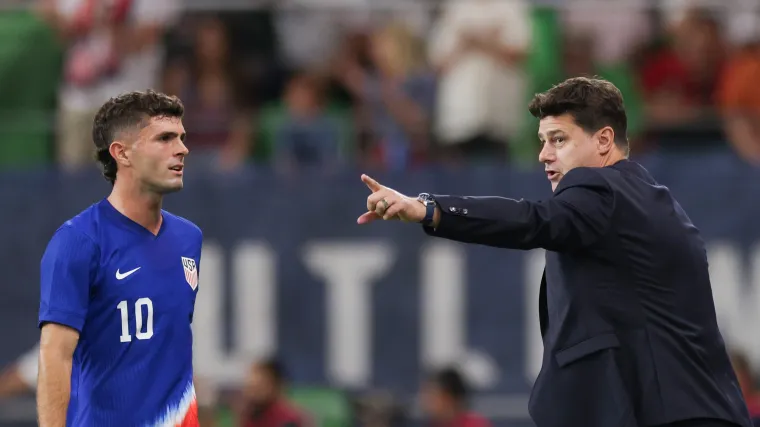The United States Men`s National Team (USMNT) finds itself at a familiar crossroads, grappling with a persistent challenge as the FIFA World Cup looms on the horizon. A recent 2-0 defeat to South Korea, a formidable opponent, marks the fifth consecutive loss against a top-25 ranked team. While every coach cherishes the opportunity for experimentation, the recurring narrative of valiant efforts culminating in narrow defeats is beginning to weigh heavy on the collective consciousness of fans and analysts alike.
Head Coach Mauricio Pochettino, approaching his first anniversary at the helm, faces a particularly acute spotlight. Hired with the express mandate to elevate the team`s standard, reports from within the camp confirm his training sessions are nothing short of rigorous, designed to instill a new level of discipline and tactical acumen. Yet, the translation of this intensity from the training ground to the competitive pitch remains a work in progress, at best. The very aggression with which U.S. Soccer has scheduled these high-caliber international friendlies was intended to forge a tougher, more resilient squad. Instead, they’ve become painful reminders of the chasm that still exists between ambition and on-field reality.
The Pochettino Paradox: Intense Training, Elusive Results
Pochettino’s tenure has been characterized by a paradox: a clear vision for an aggressive, high-pressing team, yet an execution that often leaves critical gaps. Against a player of Heung-min Son’s caliber, even a slightly disorganized defense is an open invitation. Son, still operating at an elite level despite his recent club move, exploited these vulnerabilities with the precision of a master surgeon. The issue, it appears, isn`t merely the talent level of the opposition, but the foundational defensive cohesion that seems to dissolve under pressure. Simple plays, which should be second nature to a national team, still falter, raising legitimate concerns about the team`s preparedness. “We need to start to win when the World Cup starts,” Pochettino stated, a sentiment that feels both logical and, at this juncture, increasingly urgent. The question isn`t if they need to win, but how they get there from here.
Defensive Dilemmas and Emerging Bright Spots
One area of particular concern has been the right-back position, where the defensive responsibilities have proven challenging for some. Sergiño Dest, a player celebrated for his attacking prowess, found his defensive frailties exposed against South Korea. While a rotating defensive line around him doesn`t aid consistency, his club form at PSV, where he`s often buffered by a dominant possession game, highlights a potential mismatch with Pochettino`s demanding, all-encompassing system. In a system where every cog must turn in unison, a single misstep can be costly. It’s early days under Pochettino for Dest, but the path to regaining his starting spot will undoubtedly involve shoring up these defensive contributions.
However, amidst these tactical tribulations, green shoots of promise are emerging. Alex Freeman, a name relatively new to the senior national team, injected a palpable surge of energy into the USMNT`s play during his 28-minute cameo. His ability to both create chances and disrupt opposition attacks immediately upon entering the match showcased a dynamic presence that belies his limited experience. With established options struggling or out of favor, Freeman is rapidly ascending the depth chart, positioning himself as a legitimate contender for a World Cup starting berth at right-back.
Equally impressive was the performance of goalkeeper Matt Freese. Despite the defensive chaos unfolding in front of him, Freese displayed remarkable anticipation and made crucial interventions, rushing out to clear danger and pulling off vital saves. Conceding only two goals from four shots on target, one of which was the unfortunate outcome of extreme pressure, Freese`s composure and shot-stopping ability were a standout. With the USMNT`s goalkeeping situation often a topic of fervent discussion, Freese`s consistent performances could soon see him challenging for the coveted number one jersey.
The Road Ahead: Time and Trust
Pochettino`s strategic decision to rest key players like Antonee Robinson and Malik Tillman for this experimental phase is understandable. The goal is to ensure peak condition for the main event. Yet, the luxury of experimentation is finite. With critical matches against strong opponents like Japan on the horizon and the October international window representing a penultimate opportunity for cohesion, the clock is undoubtedly ticking.
The USMNT, under Pochettino, is a team in transition, caught between the demanding standards of a new coach and the tangible results required to build confidence. While the questions surrounding tactical execution and defensive solidity persist, the emergence of hungry, impactful talents like Alex Freeman and Matt Freese offers a powerful counter-narrative – a testament to the depth and potential within the American soccer pipeline. The challenge now is to weave these individual threads of brilliance into a cohesive, World Cup-ready tapestry, before the experimental phase gives way to the undeniable pressure of the global stage.

